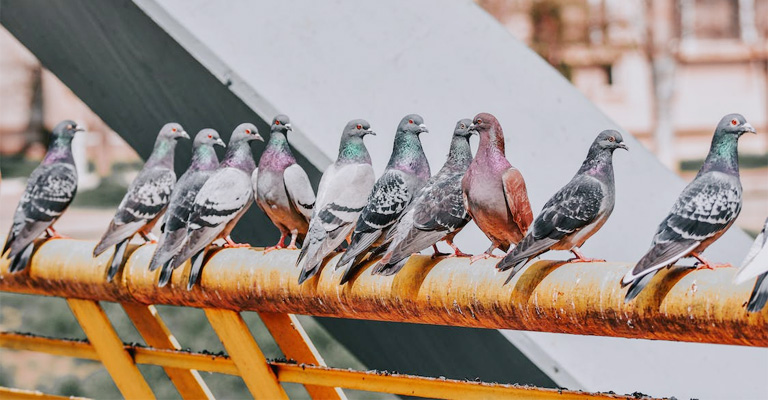In the picturesque state of California, where diverse landscapes stretch from sun-kissed beaches to towering mountains, the practice of raising pigeons finds a unique place in the hearts of many enthusiasts.
However, amid the beauty lies a tapestry of regulations that govern the art of pigeon raising. Whether you’re captivated by the gentle cooing of these feathered companions or are considering starting your own loft, understanding the legal landscape is essential.
This guide delves into ‘What are the laws regarding raising pigeons in California’, shedding light on the intricacies that encompass this avian endeavor.
From zoning restrictions to permits and codes, we unravel the crucial information every aspiring pigeon fancier should know before spreading their wings in pursuit of this age-old pastime.
Join us as we explore the legal flight path for pigeon enthusiasts in the Golden State.

What Are the Laws Regarding Raising Pigeons in California?
Raising pigeons in California is a captivating hobby that combines a love for avian companionship with the intricate art of nurturing these graceful creatures.
However, before setting up your loft and welcoming these feathered friends into your life, it’s essential to understand the legal framework that governs pigeon raising in the Golden State. So, here are the details for you:
Zoning and Location
Zoning regulations play a pivotal role in determining where you can establish a pigeon loft. Local ordinances often categorize pigeons as livestock or pets, influencing whether they can be kept in residential areas.
While some cities may permit pigeon keeping as a backyard hobby, others may restrict it to agricultural zones.
It’s imperative to consult your local zoning ordinances to determine the suitability of your property for pigeon raising. This step prevents potential conflicts with neighbors and legal repercussions.
Permits and Licensing
Certain jurisdictions in California may require permits or licenses to keep pigeons, especially if you intend to breed or sell them. These permits are intended to ensure that the loft meets health and safety standards and doesn’t contribute to nuisance or disease concerns.
Applying for the appropriate permit demonstrates your commitment to responsible pigeon raising and helps maintain the integrity of your local community.
Health and Sanitation
Maintaining a clean and disease-free environment is paramount when raising pigeons. State laws emphasize the importance of proper sanitation practices within your loft to prevent the spread of diseases among your pigeons and other avian species.
Regular cleaning routines, proper waste disposal, and quarantine procedures for new birds are not only recommended but may also be required by law to prevent potential disease outbreaks.
Biosecurity Measures
California places a significant emphasis on preventing the introduction and spread of avian diseases. Whether you’re a casual enthusiast or a dedicated breeder, adhering to biosecurity measures is essential.
These measures include limiting the interaction of your pigeons with wild birds, using disinfectants, and monitoring for signs of illness.
Implementing these measures not only safeguards the health of your flock but also contributes to the overall avian health within the state.
Escape Prevention
To maintain local ecosystems and prevent the potential establishment of non-native pigeon populations, laws may require measures to prevent pigeon escapes.
This could involve using aviaries with proper enclosures, securely locking loft doors, and ensuring that your pigeons do not have access to open spaces where they could potentially become feral and disrupt local wildlife.
Penalties for Violating Pigeon-Raising Laws in California

Understanding the potential consequences of violating pigeon-raising laws in California is essential for maintaining legal compliance and responsible avian stewardship.
While penalties can vary based on local ordinances and the severity of the violation, it’s crucial to be aware of the potential legal ramifications. Here are some common penalties you might encounter:
Zoning Violations
Violating zoning regulations can lead to fines, legal actions, and orders to cease pigeon-raising activities. Depending on the severity and frequency of the violation, you might be required to relocate your pigeons to a permitted area or dismantle your loft.
The exact penalties can vary widely between jurisdictions, so it’s essential to consult your local ordinances to understand the specific consequences.
Permit and Licensing Violations
Operating without the necessary permits or licenses may result in fines and the requirement to rectify the situation promptly. Continued non-compliance might lead to more substantial penalties or even the revocation of existing permits.
It’s advisable to thoroughly understand the permit requirements in your area and ensure that you comply with all relevant regulations.
Health and Sanitation Violations
Neglecting proper health and sanitation practices can jeopardize the well-being of your pigeons and potentially lead to legal actions.
If your loft is found to be unsanitary or contributing to disease spread, you might face fines, orders to clean and disinfect the area, or even confiscation of your pigeons to prevent further disease transmission.
Biosecurity Breaches
Failure to implement biosecurity measures can result in the spread of diseases among your pigeons and beyond. If your loft is identified as a source of disease outbreaks, you could face penalties, including fines and quarantine orders.
Additionally, if negligence results in the transmission of a disease to other pigeon fanciers or local bird populations, legal action may ensue.
Escape Prevention Lapses
Allowing pigeons to escape and potentially establish feral populations can have ecological repercussions. Depending on the circumstances, you might face fines for not adequately securing your loft or allowing birds to roam freely.
The severity of the penalties can depend on whether the escaped pigeons cause harm to the environment or other species.
Cumulative Consequences
It’s important to note that repeat violations or consistent non-compliance can escalate penalties.
If authorities observe a pattern of neglect or disregard for regulations, penalties may become more severe, including increased fines and potential legal actions.
To avoid the penalties associated with violating pigeon-raising laws in California, it’s advisable to thoroughly research and understand the relevant regulations in your area.
How to Get Permission and License to Raise a Pigeon in California?

Raising pigeons in California requires adherence to local regulations and, in some cases, obtaining the necessary permits and licenses. Here’s a step-by-step guide on how to navigate the process:
Research Local Regulations
Start by researching the zoning and animal-keeping regulations specific to your city or county. Different areas may have varying rules regarding pigeon raising, including whether it’s allowed in residential zones or restricted to agricultural areas.
Contact Local Authorities
Reach out to your local city or county’s planning department or animal control agency. Inquire about the specific regulations and permits required for keeping pigeons.
They can provide you with information on whether you need a general animal-keeping permit or a specialized pigeon-raising license.
Attend Workshops or Meetings
Some areas might offer workshops or meetings for aspiring pigeon raisers to learn about the legal requirements and best practices. Attending these sessions can help you understand the process better and connect with local experts.
Complete Application Forms
If a permit or license is required, obtain the necessary application forms from your local authorities. These forms typically ask for information about your intended pigeon-raising activities, the size of your loft, and the measures you plan to take to ensure proper care and hygiene.
Submit Supporting Documents
Along with the application form, you may need to provide supporting documents, such as a site plan of your loft, details about the materials used in the construction, and any biosecurity measures you plan to implement.
Pay Application Fees
Some permits and licenses come with application fees. Make sure to pay these fees as required. Keep in mind that these fees can vary based on your location and the type of permit you’re applying for.
Inspection and Approval
Depending on the regulations, your local authorities might conduct an inspection of your loft to ensure it meets health and safety standards. They may assess factors such as cleanliness, proper ventilation, and adequate space for the pigeons.
Receive Permission/License
Once your application is reviewed and your loft is inspected, you’ll receive a decision from the local authorities. If your application is approved, you’ll be granted the necessary permission or license to legally raise pigeons.
Comply with Conditions
It’s important to understand any conditions that come with your permit or license. This could include maintaining proper hygiene, preventing escapes, and adhering to biosecurity measures. Failure to comply with these conditions could lead to penalties or the revocation of your permit.
Renewal and Updates
Keep track of the expiration date of your permit or license. Some jurisdictions require regular renewals to ensure ongoing compliance with regulations.
If you make any changes to your loft or pigeon-raising practices, be sure to update your local authorities accordingly.
FAQs
The permissibility of raising pigeons on residential property in California varies based on local zoning regulations. Some areas allow pigeon raising in residential zones, while others restrict it to agricultural or designated areas.
Local regulations may include guidelines on the maximum number of pigeons you can raise on your property. These limits are often established to prevent issues related to hygiene, noise, and other potential concerns.
The need for a license to raise pigeons for personal enjoyment can vary depending on local ordinances. In some areas, if you’re keeping pigeons as pets without engaging in breeding or selling, you might not need a specialized license.
To find pigeon-raising clubs or communities in your area, you can search online platforms, social media groups, or local directories. Websites dedicated to pigeon enthusiasts often have directories or forums where you can connect with fellow fanciers.
If you’re considering raising pigeons for racing purposes, you might need to adhere to specific regulations and obtain any necessary permits, especially if you plan to transport pigeons across different areas for races. Contact your local authorities to understand the requirements and guidelines.
Final Words
As you embark on your journey into the world of pigeon raising in California, remember that harmonious coexistence between enthusiasts, neighbors, and local authorities is paramount.
By adhering to the regulations and guidelines set forth by the state, you can ensure not only the well-being of your feathered companions but also the preservation of the tranquil neighborhoods that make California so cherished.
Whether you’re nurturing racing pigeons for sport or raising them as cherished companions, a responsible approach will contribute to the overall enjoyment of this time-honored hobby.
Stay informed, seek advice from local agricultural clubs, and continue to appreciate the unique bond that these remarkable birds bring to your life and community.
Through adherence to legal guidelines and ethical practices, you can create a flourishing haven for your pigeons while contributing to the grand tapestry of California’s rich and diverse landscapes. Happy pigeon raising!